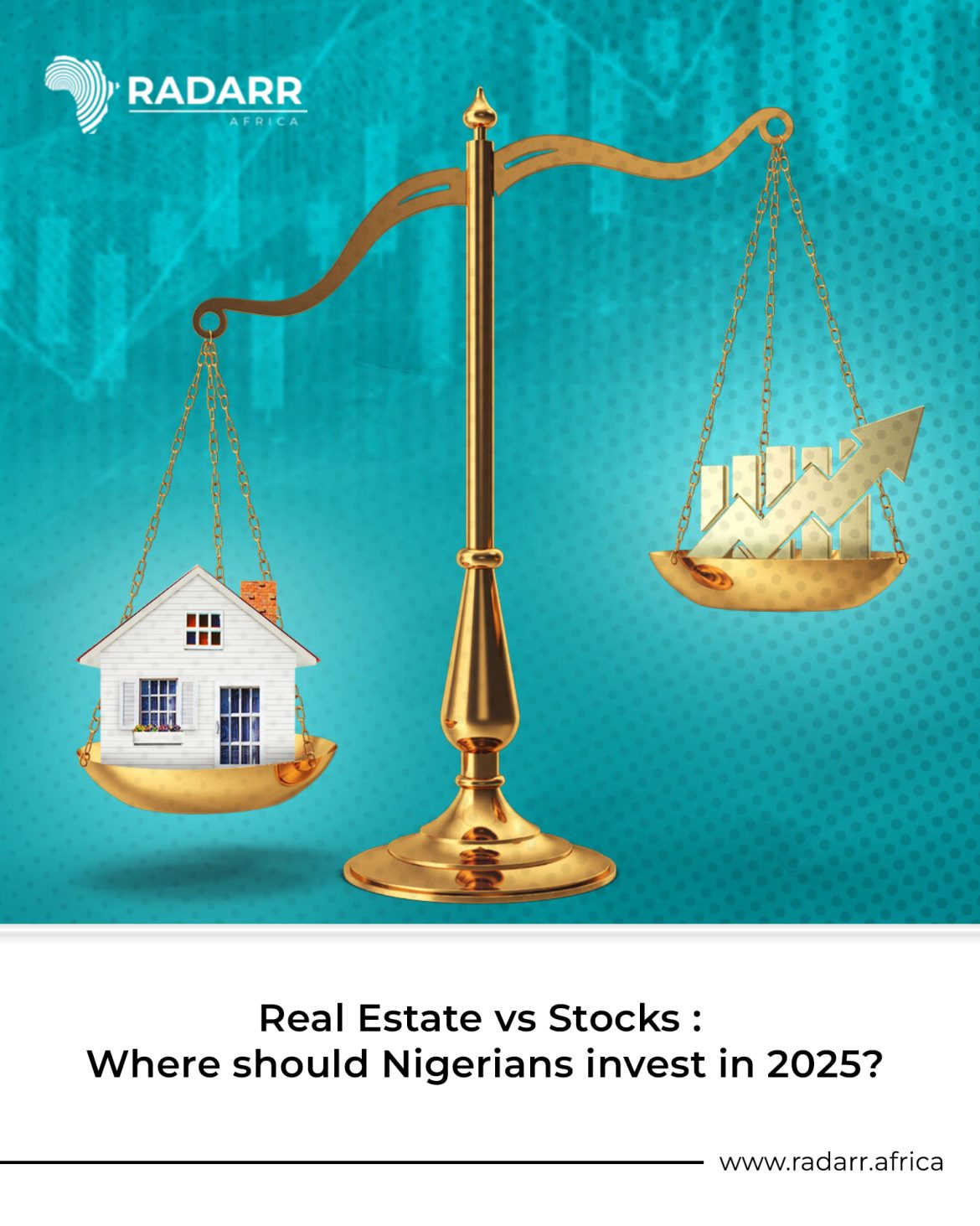In the ever-shifting landscape of Nigerian wealth creation, one debate continues to dominate dinner tables, boardrooms, and WhatsApp groups alike: should Nigerians put their money into real estate or stocks in 2025? With inflation creeping higher, interest rates fluctuating, and the naira under pressure, investors are looking for avenues that can protect and grow their wealth. Both real estate and the stock market have their champions, each with compelling reasons for being the preferred option. Yet, the question remains—where does the average Nigerian get the best returns while balancing risk, liquidity, and long-term growth?
Real estate, with its tangible assets and historic reputation for stability, has long been the darling of Nigerian investors. The appeal is simple: property does not vanish overnight, it generates rental income, and it often appreciates over time, particularly in high-demand urban centers like Lagos, Abuja, and Port Harcourt. Nigerians have always taken pride in owning land, a house, or even a shop. This sense of permanence and security is psychologically reassuring, especially in times of economic uncertainty. Moreover, owning property offers potential tax benefits, collateral for loans, and opportunities for generational wealth transfer, making it more than just an investment—it is a legacy.
Yet, real estate is not without its challenges. Entry costs are high, with prime land and property prices stretching into millions of naira. Investors often face long periods before realizing returns, and liquidity can be a major issue; selling property quickly at market value is rarely easy. Maintenance costs, regulatory hurdles, and the risk of devaluation due to poor infrastructure or changing urban plans can further complicate matters. For the young Nigerian with disposable income but limited capital, these factors can make real estate seem like a slow-moving, high-stakes game that requires patience, knowledge, and often, connections.
On the other hand, the Nigerian stock market offers a different kind of allure. With access to publicly listed companies on the Nigerian Exchange Group (NGX), investors can buy and sell equities relatively easily, often with lower initial capital than real estate. Stocks provide the potential for significant returns in shorter time frames, particularly in sectors like fintech, consumer goods, and telecommunications, which have shown resilience even during economic downturns. The appeal of dividends adds another layer, allowing investors to earn passive income while benefiting from capital gains. In 2025, technology and renewable energy stocks are increasingly capturing attention as sectors poised for growth.
However, the stock market carries its own set of risks. Price volatility is real and can wipe out investments in a matter of days, particularly in Nigeria’s economy, which is susceptible to currency fluctuations, inflation, and policy changes. Market manipulation and low liquidity in some stocks further compound investor caution. Additionally, emotional investing remains a trap for many, as fear and greed can lead to poor decision-making. Knowledge and due diligence are non-negotiable, and investors without a clear strategy may find the stock market more stressful than rewarding.
So, what factors should Nigerians consider when deciding between real estate and stocks in 2025? Risk tolerance is key. Those who prefer stability and can tie up funds for years may lean towards real estate, while those with higher risk appetite and the ability to monitor market trends closely might favour stocks. Investment goals also play a role—are you looking to generate regular income, build long-term wealth, or achieve a mix of both? Diversification can be an answer, combining property ownership with equity investments to balance security with growth potential.
Another factor is inflation and currency risk. Real estate often acts as a hedge against inflation because property values and rents tend to rise with the cost of living. Stocks, while potentially more volatile, offer the chance to outpace inflation if invested wisely, particularly in companies with pricing power and export revenues. In Nigeria’s 2025 economy, with currency pressures likely to continue, savvy investors must weigh how each asset class will protect purchasing power over time.
Technological advancements and financial innovation are also reshaping investment choices. Online platforms now allow Nigerians to participate in real estate through fractional ownership, reducing the barrier of entry and increasing liquidity. Similarly, brokerage apps and fintech solutions have made stock market participation easier than ever, offering real-time data, analysis, and educational resources for first-time investors. The democratization of investment is empowering younger Nigerians to engage with both markets more intelligently, making education and access as important as capital.
In the end, there is no one-size-fits-all answer. Real estate offers tangible, long-term security with steady appreciation, while stocks provide liquidity, potential for quick gains, and exposure to sectors driving Nigeria’s future economy. The smart Nigerian investor in 2025 will likely blend the two, tailoring portfolios to personal goals, market conditions, and risk appetite. The choice is not necessarily between one or the other, but about using each strategically to grow wealth and secure financial freedom.
For many Nigerians, this debate is no longer theoretical. The stakes are high, and the decisions made today will shape wealth for generations. Whether the path chosen is property, equities, or a hybrid of both, understanding the dynamics, risks, and opportunities is essential. As markets evolve, the informed investor will not only survive but thrive, turning challenges into opportunities in the quest to build lasting prosperity.
